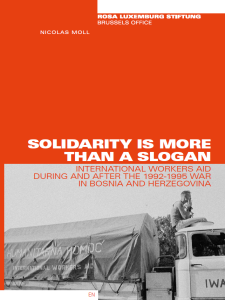Exhibition “Wake up, Europe! Support and solidarity mobilizations with Bosnia and Herzegovina and its citizens, 1992-1995”
 A project of the History Museum of Bosnia and Herzegovina, in cooperation with Memory Lab, with the support of the Goethe Institute BiH and the French Institute in BiH
A project of the History Museum of Bosnia and Herzegovina, in cooperation with Memory Lab, with the support of the Goethe Institute BiH and the French Institute in BiH
The Covid pandemic and the “migration crisis” have put the question of solidarity in Europe back on the agenda: What do we understand by solidarity? What can be done to strengthen solidarity with societies and people who are existentially threatened? There is an example of European solidarity in the near past that can be inspiring for today, even more as it is very little known: During the war in Bosnia and Herzegovina from 1992-1995, numerous initiatives arose in France, Germany, Spain, Italy, Sweden, the Czech Republic and other European countries, and citizens, NGOs, informal groups and artists articulated support and solidarity with Bosnia and Herzegovina and its citizens in various ways. The aim of this project is to provide general information about forms, activities and actors of the support and solidarity movements with Bosnia and Herzegovina in Europe during the 1992-1995 war and to illustrate them concretely using individual examples. By increasing awareness and knowledge of this little-known but important chapter in recent European history, the exhibition is also intended to stimulate the discussion for today: What can we do today to show solidarity with people and societies that are experiencing war or other crisis situations?
The exhibition was shown at the History Museum of Bosnia and Herzegovina in Sarajevo from 20 October to 18 December 2021. I was part of the organising team and was in charge of the historical research, finding the documents and writing the accompanying texts. In 2022, the exhibtion was shown, in an adapted from, in Berlin (with support of the Heinrich Böll Foundation and the Goethe Institute), in Strasbourg (with support of the Franco-German Youth Office and the muncipality of Strasbourg) and in Barcelona (in cooperation with EUROM and the City Coucil of Barcelona).
